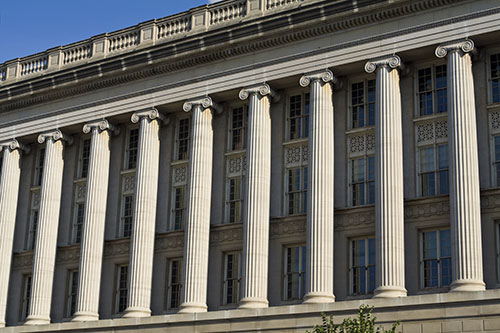launch
Bringing Academic Expertise to the Federal Government
After more than two decades at the Weatherhead School of Management, Susan Helper, PhD, brought her manufacturing and supply-chain know-how to the nation's capital in 2012. First she worked for the White House as part of its Council of Economic Advisers and she now is chief economist for the U.S. Department of Commerce.
During her leave from Case Western Reserve, the Frank Tracy Carlton Professor of Economics has applied lessons from her research to public service. At the same time, she has gained on-the-ground insights about creating public policy.
"We know that regional clusters of economic activity—that is, having people doing similar things, from making semiconductors in Silicon Valley to rugs in Dalton, Ga.—improves economic and learning opportunities for everybody," Helper said. "It has been great to have the chance to translate my research insights in this area into recommendations for federal policies and funding that could help spur the expansion of clusters."
Helper is one of several Case Western Reserve professors who have put their academic expertise to work for the federal government. Others include:
Kathryn Lavelle, PhD, the Ellen and Dixon Long Professor of World Affairs, was a Congressional fellow during the 2006-2007 academic year, serving on the staff of the U.S. House of Representatives Committee on Financial Services. Lavelle's responsibilities included organizing hearings related to the International Monetary Fund and World Bank and working on legislation involving international financial institutions. She even had a close-up view of one of the biggest financial crises in U.S. history when she attended an early hearing on reforming Fannie Mae and Freddie Mac, two organizations the federal government launched to support the housing market. "Observing the committee at work has given me enormous insight into the world of policymaking that I lacked before," she said.
Alexis Abramson, PhD, professor of mechanical and aerospace engineering and faculty director of the university's Great Lakes Energy Institute, spent the 2011-2012 and 2012-2013 academic years as a chief scientist with the U.S. Department of Energy, where she oversaw the development of cost-effective, energy-efficient building technologies that could be marketable within five years. She said the experience was a "tremendous opportunity" that also will benefit students in the classroom who want to learn about energy innovation and the federal government. "I can help the CWRU community navigate federal research opportunities more successfully now," she said.
Sharona Hoffman, JD, the Edgar A. Hahn Professor of Law, co-director of the Law-Medicine Center and a professor of bioethics, spent the 2014 spring semester at the Centers for Disease Control and Prevention in Atlanta as a distinguished scholar in residence. She worked on legal and ethical implications of the use of big data in tackling public health issues ranging from disease outbreaks to obesity. She said she loves working for the government. "It gives lawyers an opportunity to make a real contribution and do good for society," she said.
For Helper, the opportunity to work for the federal government began when she became a senior economist for the Council of Economic Advisers, which counsels the president on domestic and international economic policy. After her one-year term ended, Helper moved to the Department of Commerce in the summer of 2013.
She has worked on topics ranging from international trade to manufacturing to Internet policy. One of her most memorable experiences came this past summer when she attended an event with President Barack Obama and numerous business CEOs to encourage executives to sign a pledge to pay suppliers more quickly. Helper said she helped design the pledge policies.
The Washington experiences, she said, have better positioned her to tell fellow faculty or students: "Here's how to structure a policy proposal so that it might get heard; here's evidence that might be useful."
"I certainly learned how the government works. And nobody can appreciate that unless you live it. I really took away an appreciation for the complexity of the government."
—Alexis Abramson, PhD, professor of mechanical and aerospace engineering
"I had always wanted to put my research to use and I wanted to do public service. Here was a chance for it to happen. The public service is using my research to hopefully design a better economy, promote a better economy."
—Susan Helper, PhD, the Frank Tracy Carlton Professor of Economics and currently the chief economist for the U.S. Department of Commerce
"For me, my time at the CDC (Centers for Disease Control and Prevention) was very important because teaching law students should be about teaching them what goes on in the real world. ... Students will give answers to problems and I'm able to throw real-world complications at them."
—Sharona Hoffman, JD, the Edgar A. Hahn Professor of Law, co-director of the Law-Medicine Center and a professor of bioethics
"As a teacher, I'm able to use my observations in the classroom to help students understand what books can teach us about politics and where theory diverges from the practice of politics."
—Kathryn Lavelle, PhD, the Ellen and Dixon Long Professor of World Affairs
—SUSAN VALERIAN






